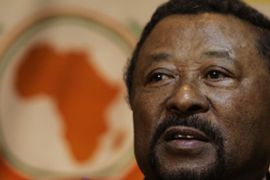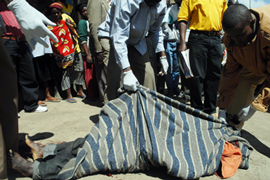AU chief urges Kenya political deal
Jean Ping’s appeal comes after government’s acceptance of a power-sharing plan.

Musalia Mudavadi, an ODM official, said Odinga was still available for consultations and was due back on Saturday.
George Nyamweya, a spokesman for the party of Mwai Kibaki, the Kenyan president, called Odinga’s departure unexpected, but not necessarily a sign that negotiations had taken a sour turn.
“He’s free to go and come as he pleases,” Nyamweya said.
Executive role
The conclusion of successful talks has hinged on the creation of the role of prime minster, which the ODM has demanded.
The government agreed on Thursday to set up a new post of prime minister, but both sides have yet to thrash out the most contentious issue of how much power it will have.
| Your Views |
Odinga’s ODM has withdrawn an earlier demand for Kibaki to resign, but is threatening to resume street protests if requirements for the new prime minister’s post are not met by Wednesday.
Peter Anyang Nyong’o, secretary-general of the ODM, said that he expected an agreement by the end of Friday.
Kofi Annan, the chief mediator and former UN secretary-general, said he was beginning to see “light at the end of the tunnel” on Thursday.
The tussle between Kibaki and Odinga over who won the December 27 election plunged the country into bloody protests and ethnic clashes that have killed more than 1,000 people.
Economic stability
Amid the political deadlock, Juma Mwapachu, the secretary-general of the East African Community (EAC) states, a regional trade bloc, said on Thursday that the Kenyan political stalemate has choked business in the region.
 |
| More than 1000 people have been killed in the post-election violence in Kenya [AFP] |
Kenya is East Africa’s biggest economy and the gateway to neighbouring landlocked EAC countries Burundi, Rwanda and Uganda.
Supplies of fuel, raw and manufactured goods into the three countries have been stifled.
Mwapachu said: “The Kenyan political impasse imposes a difficult and complex environment for the EAC; for investment promotion and for business players alike in the region.
“Trade flows have been negatively affected and so have exchequer and business revenues.
“We can only promote and attract investments sustainably as well as assure effective intra-regional trade, if we have enduring peace and stability.”